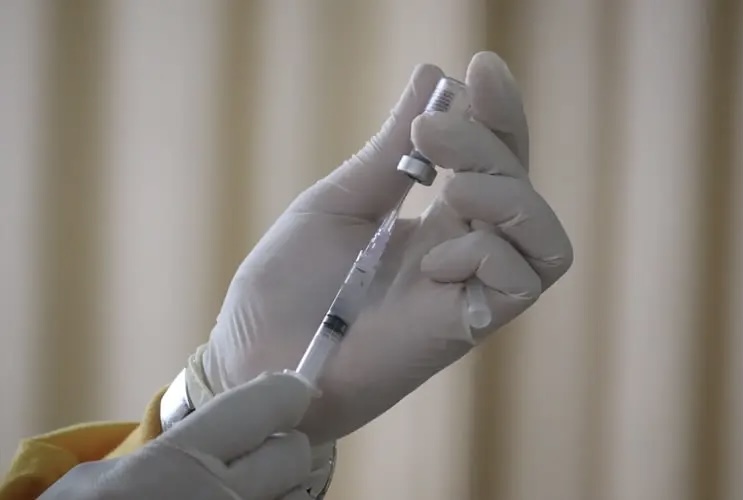News
Husband Who Wanted To Sell His Kidneys Blames Covid-19 Vaccine For Wife’s Death

Robert Mugasia who was willing to sell his kidneys to offset the pilled hospital bills has announced that he lost his wife. In a viral tweet, the husband in distraught claimed that the wife’s health started to deteriorate after taking AstraZeneca jab against Coronavirus.
“I’m selling one of my kidneys to cater for the treatment of my wife. I’m willing to do anything to save her life. I have done everything I could. I have exhausted everything. Her life took the wrong turn on that day she took Astrazeneca jab.” Robert said in a tweet that he was later forced to pull down following Twitter restrictions.
In a post, he’s now reaching out to well wishers to help him in giving the wife a send off.
Her life took the wrong turn on the day she took her jab. She finally lost the battle. She gave up. She is gone. Rest in everlasting peace Mama Annet. RIP.
Those who wish to stand with me in meeting funeral expenses can do so on 0741718461 pic.twitter.com/y2tPL3HPPt— Kiberenge Jnr (@RobertKiberenge) November 10, 2021
In a pensively post, Robert who’s fully blaming the death of his wife on the vaccine, is vowing not to take the jab.
I would rather die of covid19 than go for a jab that will make me suffer in pain. If only she never went for that jab… pic.twitter.com/IK7NBwqfzo
— Kiberenge Jnr (@RobertKiberenge) November 5, 2021
Majority of Kenyans have taken the AstraZeneca vaccine and even though cases of side effects have been reported, this could perhaps be the first case of death that is being blamed on the vaccine.
In August, Ministry of Health warned insurance companies purporting to cover side effectspurporting to cover side effects allegedly caused by the Covid-19 vaccination.
The ministry termed such adverts by the said companies as unethical and denotes that vaccines are unsafe and need underwriting.
The warning came after one of the insurers unveiled a cover for Covid-19 vaccine side effects. Individuals were to pay Ksh2,950 for the insurance policy dubbed ‘Chanjo’, which has a limit of Ksh500,000 for inpatient treatment.
At the end of 2020, the AstraZeneca shot was among the front-runners in the race for a COVID-19 vaccine. It showed promise in clinical trials, provoking a robust immune response suited for protection against the virus. The U.S. ordered 300 million doses, enough to cover 150 million people, and the E.U. initially ordered 80 million doses.
Then things changed.
Multiple countries have paused the use of AstraZeneca’s COVID-19 vaccine as a precaution while investigators look into cases of blood clots among vaccinated people.
In response to the suspensions of its vaccine, AstraZeneca said it had carefully reviewed the data on 17 million people who received doses across Europe. It said there was “no evidence of an increased risk” of blood clots in any age group or gender in any country, Reuters reported.
The World Health Organization (WHO) issued an emergency use listing for the AstraZeneca and Pfizer vaccines after they were shown to be both effective and safe.
The government has maintained the vaccines are safe.
The ministry further scolded the posts and advertisements circulating in social media on the issue as misleading and may lead to a vaccination boycott by a section of Kenyans.
Kenya Insights allows guest blogging, if you want to be published on Kenya’s most authoritative and accurate blog, have an expose, news TIPS, story angles, human interest stories, drop us an email on [email protected] or via Telegram
-

 Grapevine6 days ago
Grapevine6 days agoAlleged Male Lover Claims His Life Is in Danger, Leaks Screenshots and Private Videos Linking SportPesa CEO Ronald Karauri
-

 Lifestyle1 week ago
Lifestyle1 week agoThe General’s Fall: From Barracks To Bankruptcy As Illness Ravages Karangi’s Memory And Empire
-

 Grapevine2 days ago
Grapevine2 days agoRussian Man’s Secret Sex Recordings Ignite Fury as Questions Mount Over Consent and Easy Pick-Ups in Nairobi
-

 Investigations2 weeks ago
Investigations2 weeks agoEpstein Files: Sultan bin Sulayem Bragged on His Closeness to President Uhuru Then His Firm DP World Controversially Won Port Construction in Kenya, Tanzania
-

 News2 weeks ago
News2 weeks agoAUDIT EXPOSES INEQUALITY IN STAREHE SCHOOLS: PARENTS BLED DRY AS FEES HIT Sh300,000 AGAINST Sh67,244 CAP
-

 Business2 weeks ago
Business2 weeks agoKRA Can Now Tax Unexplained Bank Deposits
-

 Investigations1 week ago
Investigations1 week agoEpstein’s Girlfriend Ghislaine Maxwell Frequently Visited Kenya As Files Reveal Local Secret Links With The Underage Sex Trafficking Ring
-

 News1 week ago
News1 week agoState Agency Exposes Five Top Names Linked To Poor Building Approvals In Nairobi, Recommends Dismissal After City Hall Probe


















